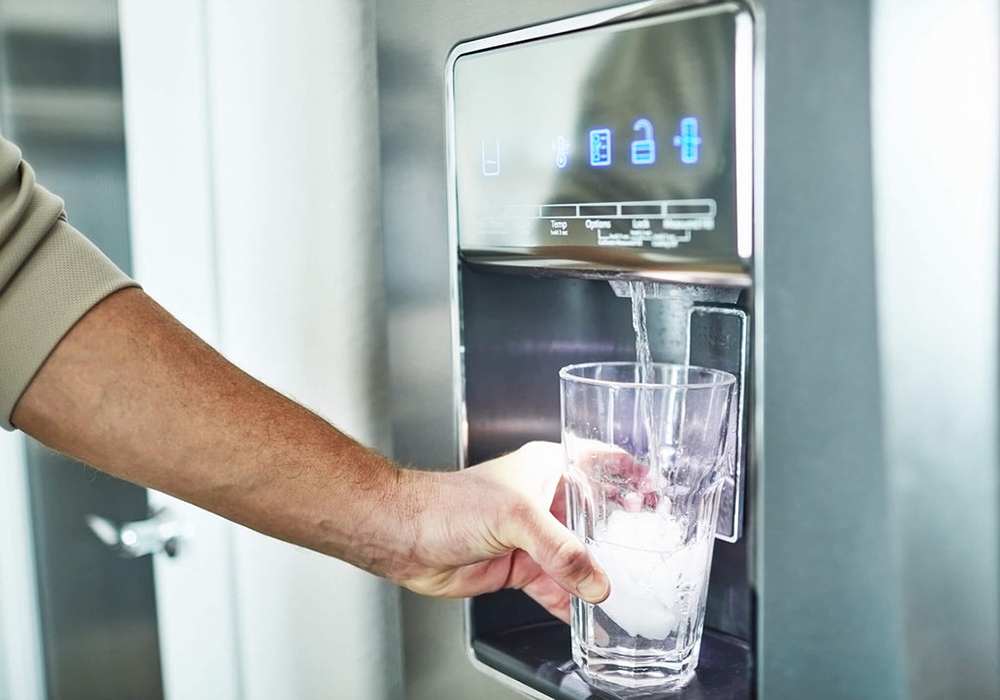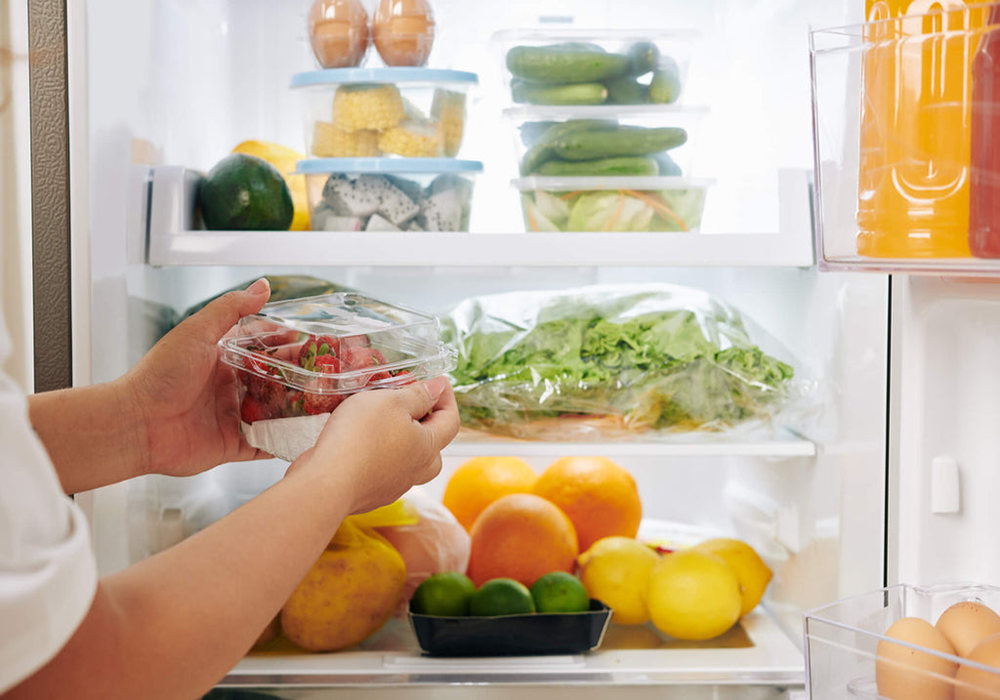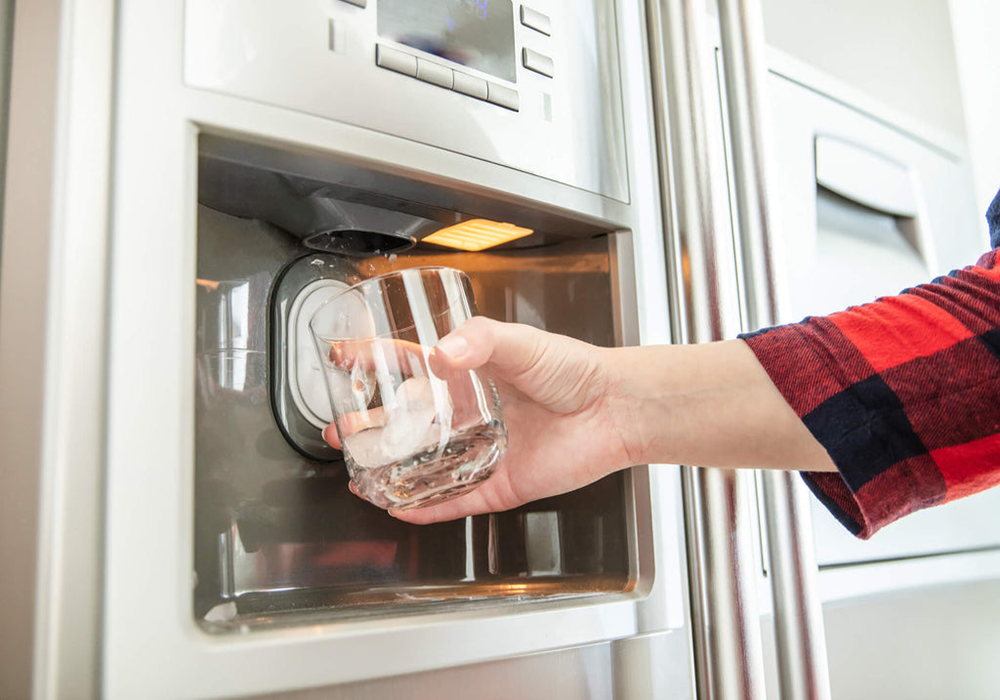Almost all modern refrigerators are equipped with both water and air filters. However, we often take the benefits of these filters for granted. When food goes bad, water tastes bad, or the refrigerator smells pungent when you open the door, the behind-the-scenes work of the refrigerator’s water and air filters becomes clear. But how well do refrigerator filters work? Read on to learn more about refrigerator filters, what they are designed to remove, and alternative solutions to water contamination.

What is a refrigerator filter?
Refrigerator filters clean drinking water that exits the refrigerator’s water dispenser or air as it enters the system. The term refrigerator filter can refer to the water or air filter inside the refrigerator, but it more commonly refers to the water filter. While the refrigerator water filter removes bad tastes and odors from water, the refrigerator air filter cleans the air circulating in the refrigerator. Refrigerator air filters are usually installed at the rear of the refrigerator. They help food stay fresher longer, spoil less and do not mix odors with other foods. The refrigerator water filter is installed in the housing whose location depends on your refrigerator model. They make tap water taste more pleasant by removing chemical additives.

How do refrigerator filters work?
The refrigerator water filter uses a combination of sediment filtration and activated carbon. They are designed to remove three major contaminants from water: lead, chlorine, and volatile organic compounds (VOCs). Lead and VOCs are contaminants regulated by the EPA, which means tap water must contain levels of these contaminants below a certain threshold. On the other hand, chlorine is added to tap water to kill microorganisms in the water. Although chlorine is effective in making water microbiologically safe, it causes the water to have an unpleasant taste. Refrigerator water filters help remove these bad tastes and odors from tap water.
Refrigerator air filters use carbon-based filter material to neutralize odors and bacteria in the air introduced into the system. The recirculated air also passes through the filter, ensuring the air that comes into contact with your food is free of bacteria. Food will spoil faster without an air filter in the refrigerator and can be contaminated with odors and bacteria from other foods.
Is refrigerator water safe to drink?
Yes, the water in your refrigerator is drinkable if your refrigerator is connected to a treated municipal water source and the safety of the water is not compromised. If you are advised to boil water, you should not drink or cook with water from the refrigerator that has not been boiled first. If you get your water from a well, you must first install a proper whole-house water treatment system before the water in your refrigerator is safe for drinking or cooking.
Does the refrigerator filter work?
Yes, refrigerator water and air filters effectively remove the contaminants they are designed to remove. However, if your goal is to remove as many contaminants from water as possible, then a refrigerator water filter will not meet your requirements. Rather, refrigerator water filters are intended to provide water that removes unpleasant tastes from tap water. For more advanced filtration, you will need a different type of water treatment system.
Advantages of refrigerator water purifier

Refrigerator water filters offer many advantages over other types of water filters and treatment systems.
Advantages: Fridge water filters simply have to be changed every six months. While waiting, you can enjoy filtered water from the refrigerator immediately.
High flow rate: Unlike many other filtration systems, such as reverse osmosis, refrigerator water filters filter as fast as the water dispensed from your refrigerator.
Inexpensive: The cost of refrigerator filters typically ranges from $30 to $60. Because they must be changed every six months, they cost about $60 to $120 per year.
Delivers great-tasting water: The refrigerator water filter is designed to provide good-tasting and clear water.
Easy to replace: When it’s time to replace your refrigerator water filter, simply unscrew the old filter, install the new one, and flush the system.
Compact: Because the refrigerator is designed with a special housing for the water filter, the refrigerator water filter does not take up usable space.
Filtering ice-making water: The refrigerator water purifier not only conveniently filters drinking water, but also filters water used to make ice.
Disadvantages of refrigerator water purifiers
Although they offer many advantages, refrigerator water filters are superior to many other filtration systems.
Doesn’t tackle many contaminants: Some filtration systems, such as reverse osmosis, tackle far more contaminants than a refrigerator water filter. Refrigerator filters should never be the only filter used on contaminated water sources.
May become clogged: To avoid clogging, remember to change the filter every six months.
Advantages of refrigerator air filters
Keep food fresh longer: By killing bacteria and removing particulate matter from the air in the refrigerator, the refrigerator air filter prevents food from spoiling as quickly as it should.
Prevent cross-contamination: Fridge air filters can help you avoid foodborne illness by preventing bacteria from one food from affecting other foods.
Neutralizes odors: Fridge air filters keep your refrigerator smelling fresh and clean.
Disadvantages of refrigerator air filters
Higher upfront cost than no filter: While refrigerator air filters are inexpensive, they are more expensive than no air filter at all. However, because refrigerator air filters can prevent food from spoiling quickly, they can help you save on food costs over the life of the filter.
It can be easy to forget: Many modern refrigerators have a filter light to remind you when it’s time to change your air filter. Others may not, making it easy to forget when you need to change your air filter.
Alternatives to refrigerator water filters
Instead of using a refrigerator water filter for drinking and cooking water, you can use a point-of-use system installed under the kitchen sink, a countertop filtration method, or a water pitcher filter. All of these options have advantages and disadvantages when it comes to cost, maintenance, and filtration quality.
Reverse osmosis system
Reverse osmosis (RO) systems are a high-purity alternative to refrigerator filters. RO systems not only eliminate bad tastes and odors caused by chlorine and chloramine, but also reduce levels of most other contaminants. The RO system is installed under your kitchen sink, allowing for convenient access to water for drinking and cooking. Unless the system has a booster or permeation pump installed, an RO system does not require electricity to operate. Although convenient, reverse osmosis systems do not work as quickly as refrigerator water filters.
A reverse osmosis system can cost as little as $280. Although RO systems are much more expensive than refrigerator filters, the quality of water produced by RO will justify this price difference. The water produced by an RO system is also more versatile. Unlike filtered water from the refrigerator, RO water can be easily used for cooking, washing vegetables, and washing dishes.
Advantages:
– Reduces levels of most contaminants
– Holds more water than a bottle
Disadvantages:
– Installation is more complicated than other under-sink systems and water tank filters
– Cannot be installed in rented property
– More expensive than other options
– Has limited storage capacity, unlike refrigerator filters
See more: Các thiết bị quản lý nước tại nhà hiệu quả
To learn more about other powerful and unique water filtration systems distributed by Song Phung, order online at the website https://thietbinganhnuoc.com/san-pham or call us on our hotline 0913.90.72.74 – 0984.620.494 for detailed advice.
Follow Fanpage: https://www.facebook.com/SongPhungthietbinganhnuoc/ to be updated with new products.


